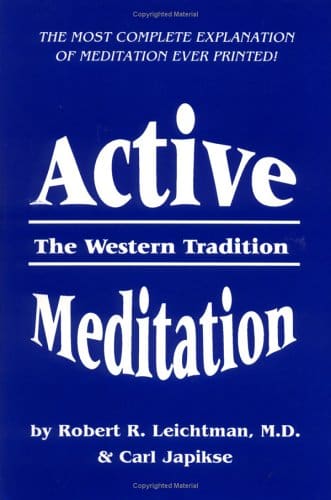For years, our students have been asking us to write a comprehensive book on meditation—one that would examine the purposes and traditions of meditating, list basic techniques, and describe the common difficulties people might encounter. For years, our usual response has been: “But that would be encyclopedic!” Eventually, however, we began to entertain the possibility seriously. We got together and started to exchange our views.
“There are a lot of books out on meditation,” Bob noted. “Who would really want to buy another one?”
“Do we know enough?” wondered Carl. “It would be a lot of work,” said Bob.
“Maybe we should just put it all on cassette tapes,” suggested Carl.
The trend of the discussion had become evident. Finally, Bob remarked, “How did we ever get it into our heads that we should write a book on meditation in the first place?”
The room brightened visibly with that comment— but not through the doing of either of us. A voice which sounded as clear and pure as the primordial Word came to us from out of the light. “So, what makes you think it was your idea, anyway?” Slowly, a form emerged from the light to possess the voice. It looked like an angel.
“The idea was mine,” the angel said. “Yours?” we chorused in disbelief.
“Yes. I’ve eavesdropped from time to time when you’ve taught, and I’ve heard you grumble about how many people are misled by phony gurus and stupid techniques—and the books that have been written about them. I like your common sense style.”
“You do?” “Oh, yes. And I’ve waited long enough for you to get the hint: it’s time to put up or shut up, as they say. You invoke a certain responsibility when you talk that way, you know. So, now it’s your chance to spread the word about effective meditation. I will help you.”
Carl looked at Bob, and Bob looked at Carl. “Do you suppose we’ve gone around the bend?” asked Carl.
“I don’t know, but maybe we ought to find out what the bend has to offer,” replied Bob.
So we decided to humor the angel. “If you want us to write the book, where are the gold tablets? Show us the gold tablets, and we’ll do it.”
“Have you seen what’s happened to the price of gold lately?” the angel replied. ”I’m asking you to write a book, not make a movie. You’ll have to come up with your own gold.”
“Our own gold?”
“Sure. The real gold is the substance of inspiration.” “Ah, so you’re going to dictate the book to us?”
“No, you know what to say. This should be a book of common sense, not spiritual nonsense.
If I dictated it, people would do it just because an angel told them to. That’s a stupid reason. They should do things because they make sense. So use the ideas you already have. But you can mention me at the beginning.”
“Is that such a good idea?” we asked. “ There are some who would be too impressed by an angel, like you say, but there are a lot of others who don’t accept things like angels. Mentioning you might strain our credibility.”
“Nonsense! If they can’t accept an angel, how are they going to accept their own higher self? How are they going to meditate? Talking with the higher self is just like talking to an angel, you know. It should be an intelligent communication and relationship with the angelic nature of the human spirit.
“Listen: don’t be afraid to tell it like it is. Don’t worry about the people who might be offended if you spell out what meditation is and what it isn’t. Or if you spell out what the nature of the human spirit really is, and what it isn’t. That’s the whole purpose of this book. The people with the eyes to see won’t be offended. Even by me.”
We were becoming more impressed by what our visitor had to say. Even without the gold tablets, we began to believe that we ought to write the book. But we still had reservations. “Communicating with the spirit is more than just talking and getting ideas,” said Bob. “It involves tapping all the light and love of the spirit, too. Are we going to be able to convey all that in a book?”
“I speak many languages other than English, and so can you. And I’m not referring to French or Russian, either. I’m talking about the languages of courage, peace, reassurance, enthusiasm, and hope—the very power of these qualities. You don’t have to write about these qualities; just write with them. Your readers will get the message.
“Listen: I have to fly. Materializing like this isn’t easy, you know.”
“Hey!” Carl called after the angel, who had half vanished. “You haven’t told us your name. What do we call you?” “If I tried to pronounce my real name,” the angel smiled, looking much like the Cheshire cat by now, “I would burn down your house. So just call me Herman.” “Herman?” we cried together.
“Yes, Herman. That will remind you that I am both a he and a she, and neither he nor she, too. I’m an angel. I’m a Herman. Your spirit is a Herman, too. Keep that in mind as you write.”
And the last of Herman disappeared. But the angel that is both a he and she, and neither a he nor a she, did not go far. Herman graces every page of this book, just as spirit graces the life of every human being. As you read, look for Herman. The effort will be well rewarded.
